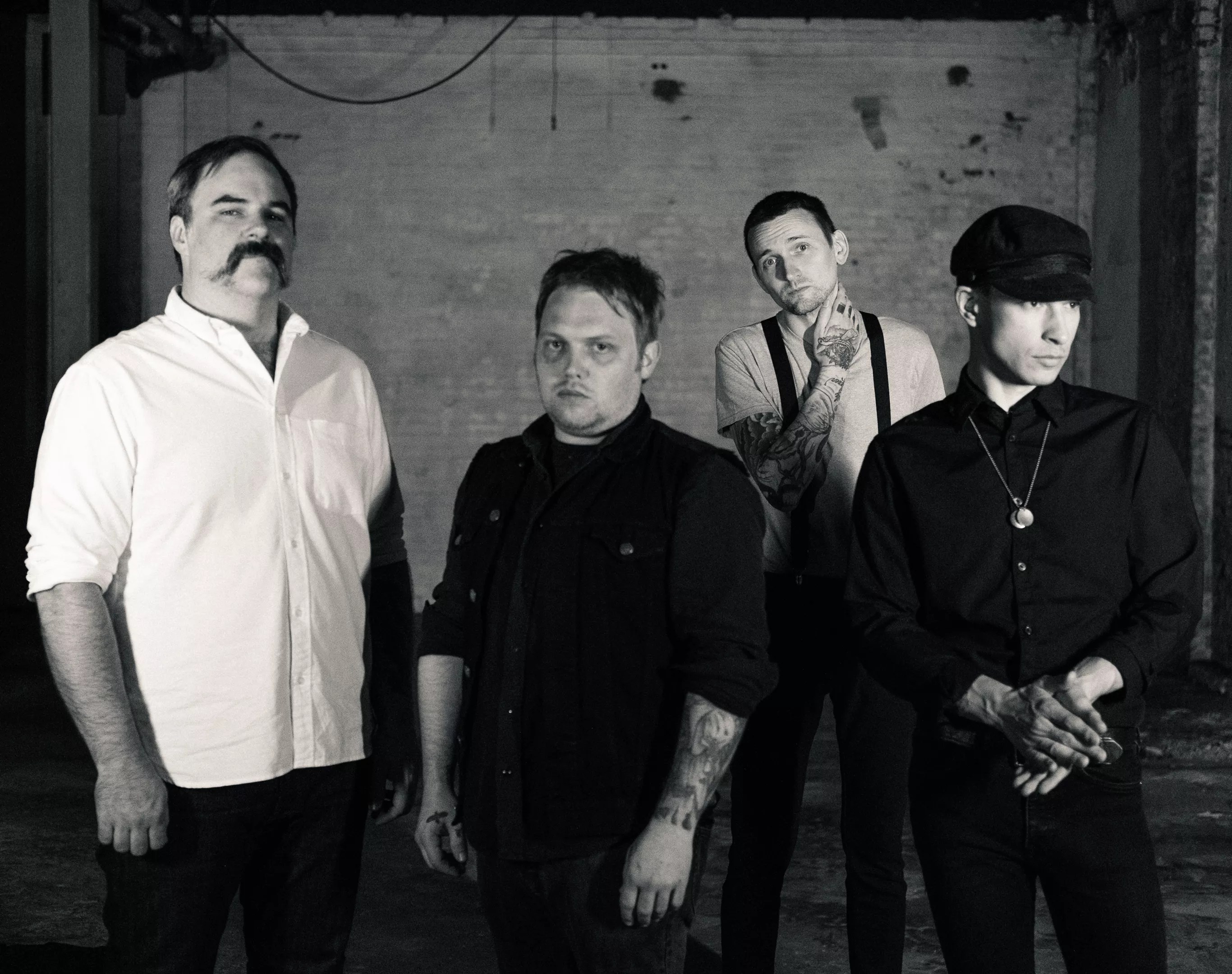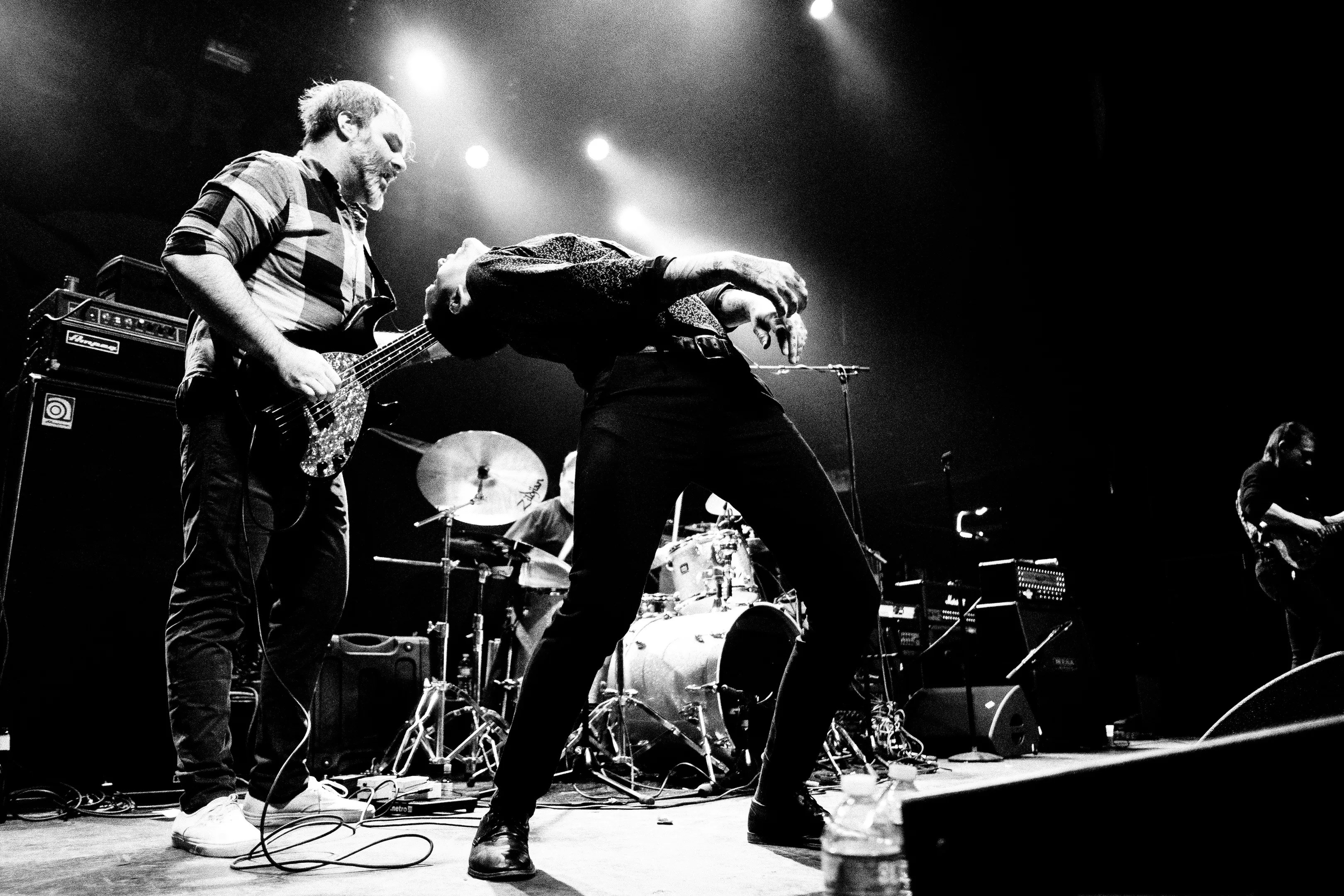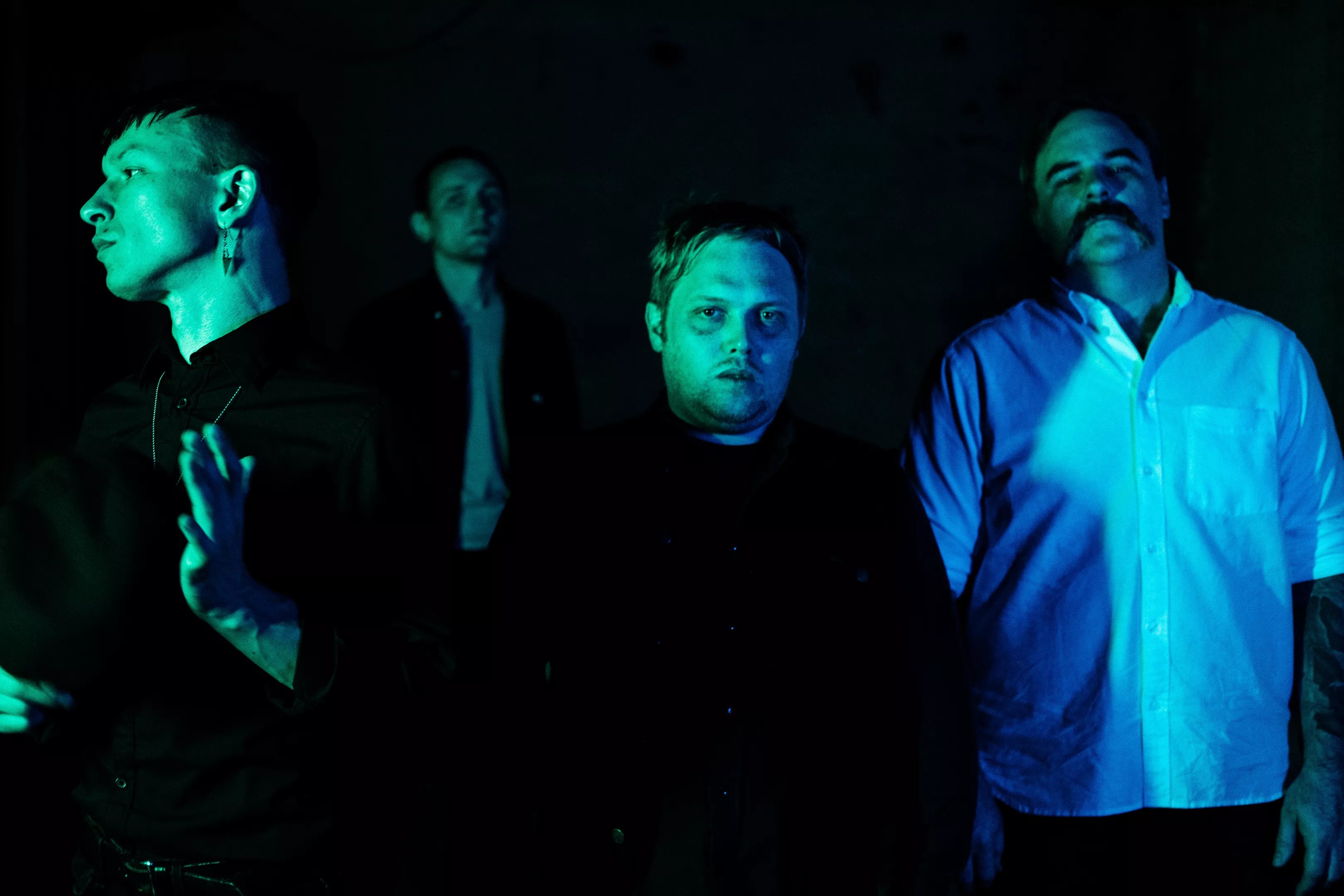
Reid Haithcock

Audio By Carbonatix
Known for unpredictability, the Providence-bred noise band Daughters reaffirmed that reputation with its latest release, You Won’t Get What You Want. A captivating horror score punctuated by layered guitar shrieks and wails, the record picks up where the group’s previous release, 2009’s Daughters, left off, for a hair-raising ten-song, 48-minute detour that is at times frantic and at others disturbingly beautiful.
We caught up with singer Alexis Marshall about his approach to the band’s first record in eight years – and why he thinks everyone is suddenly a critic – ahead of Daughters’ March 5 concert at the Gothic.

Bassist Samuel Walker and vocalist Alexis Marshall performing in New York City.
Reid Haithcock
Westword: ‘Weird’ is perhaps too simple of a descriptor, but I’ve always found the type of bands that come out of Providence, Rhode Island, interesting. Bands like Lightning Bolt, Arab on Radar, or the Body, for example. They often have an experimental edge.
Alexis Marshall: A lot of it has to do with there being a lot universities and colleges in the city, like Brown University, RISD [Rhode Island School of Design] and Johnson & Wales. It’s sort of beholden to that. I think because of the presence of places like Brown and RISD, a very important art school, that many people of different backgrounds end up in Providence. Then you have – I don’t want to use the term “the scum” – but some of us who are just there [laughs]. It’s a really great blend of personalities and ideologies. There is so much art in the city that it shouldn’t be a surprise that the music scene there is sort of all over the place.
You’ve done a great deal of your Daughters recordings over the years at the Providence studio Machines With Magnets. Was it more important to have Seth Manchester from the studio in co-production this time around, given the physical separation of the band, with members living in three different states and sharing ideas via Dropbox and rehearsing in Providence as schedules allowed?
This was the first time Seth was actively producing and working with us in a really hands-on way. It was needed, because there were a lot of questions, and there was an eight-year gap in releases. It would be a lie to say that there wasn’t some pressure to put something out that’s really good. With Seth, we were in a familiar place. As much as we are not really based in Providence anymore, that’s home. I still consider us a band from Providence even though half of us don’t live there; I’ll always think that. To have Seth and be in a familiar place where we’ve recorded before – especially with a very light spread of anxiety from it having been a long time, not rehearsing every day, not having played some of the songs all the way through together – was nice to have.
Did you approach the album with any specific ideas or themes you wanted to address lyrically?
No. We didn’t sit down and discuss themes or any kind of aesthetic. I’ve been fortunate that every band and everyone I’ve played with has sort of let me write whatever I want. But I do try to be conscious of what I’m saying, how it applies to people, and the other people in the band. It’s much more about human emotion or a story-like narrative as opposed to me talking about any kind of topic politically or socially, because not everyone is going to feel the same way about the same thing, and there’s no reason to have that kind of debate internally.
I think the record itself has a very somatic feel to it. Everything feels intentional though it is unintentional. I think that the music that Nick (Sadler, guitarist) wrote and the lyrics that I wrote really complement each other. I think that if either of us tried to do it intentionally, thinking too much about the other person, we would have missed something of ourselves. Maybe Nick would have held something back, or maybe I would have written some song about my feelings or something boring like that.

Reid Haithcock
On “The Reason They Hate Me,” you speak to the idea of criticizing something that someone else has created and treating your criticism and their creation as equal works. This happens often in music journalism. Do you think this egotism is more ingrained in today’s culture, or is it now just more obnoxiously projected?
It used to be that if you wanted to be a critic, it took effort and work. You had to aspire to get there, and people did and were good critics. They didn’t necessarily just give their opinion, like, “This is stupid. This is a bunch of bullshit.” They discussed the art therein: “Here is what is happening; here is my take on it; you decide if this works for you or not.” That’s not what happens anymore. You can just put your meaningless, bullshit opinion anywhere you want and somehow decide that it’s a creation. Like, my critique of this art is now in itself art. It’s like, no, you have created nothing. Every son of a bitch has an opinion. People have said a lot of bad shit about us, and that’s fine; I’m okay with it. But just because you have something to say doesn’t mean you have something to offer.
I think there are too many people who just want the attention and the accolades that come with all this. They want to be a part of the conversation, but they don’t fight to get to that end. If you fight, and you’re fucking good, and you can do it, you’ll stick it out and will see it through. But people don’t have to fight and stick it out anymore, and that’s why there’s so much bad shit out there. So many lousy opinions and mealy-mouthed motherfuckers who are just like, “Here is the first thing I have done. I am part of this now. I make art. I have a say!”
Do you feel that critics should have personal experience in the realm that they are critiquing?
I think they should, absolutely. I think it would be beneficial to them, to understand. There are just so many nuances. At the end of the day, people are getting upset and angry and spewing hate about fucking art. It’s just art. If you don’t like the book, read a different book. If you don’t like the movie, don’t watch the movie. If you don’t like a band, just move on. There’s an unbelievable amount of music out there. You couldn’t hear it all if you tried. But this idea that anyone has this right to shit all over everybody?
And also, these fucking fraud journalists who call themselves journalists, who do no research, who write some bogus thing because they just want people to look at them. Their concern is not necessarily the critique, or art, or the relaying of information, or turning anyone on to anything. Their interest is getting people to read what they wrote. That’s it. And that’s why I find it insincere and bogus. If you cared about art, and you’ve gone through the kind of excruciating experience of creating something and then putting it out into the world, you probably are less of a piece of shit, and you won’t be such an asshole about it. Of course, there are always exceptions to the rule.

Reid Haithcock
Is there a book or author you’ve read recently that you are really into right now or whose writing you think is really important?
There are always people who are staples for me, whose writing I would say is more important than other writers. Someone like Raymond Carver, for example. The beauty of an author like Carver is that in what seems to be mundane, where there seems to be nothing going on, there is something happening between the lines, and it is profound and will affect you more deeply and resonate more than a very elaborate production. The simplicity of it is sobering. It’s not just bells and whistles. And people overlook that because it’s not loud. Because everything should be a Marvel movie or an issue of Hustler, where you should be slapped in the face with what it is.
There are a lot of great poets who have something really profound to say without making you feel like you need a degree to interact with this piece of work. Charles Simic is a favorite of mine; I think that he says so much. [Carl] Sandburg is another.
There are plenty of reviews drawing comparisons between you and singers like David Yow (the Jesus Lizard) and Nick Cave. Are there any singers, or actors even, who don’t get mentioned as much in the popular conversation who you find inspiring or who influence the way you approach your position as a singer?
I’m more interested in energy than sound. I often get comparisons to David Yow and Nick Cave because I think that they’re just the easiest for people. They’re the most popular, and people are often very lazy. I can see them, to an extent, but I think if you listen to a Jesus Lizard song and then listen to me sing, it doesn’t sound the same. There is really nothing there aside from some aspect of the delivery, maybe. There is an energy that’s within it, and that’s what I find interesting and fascinating. Like Iggy Pop. I find his energy incredible. And David Yow and Nick Cave in the Birthday Party era, too. That kind of energy says more to me. Singers like Scott Walker or Beth Gibbons of Portishead – these are people I admire. I don’t know why I don’t get compared to Gibby Haynes or something [laughs]. I feel like there are more apt comparisons.
Daughters, 8 p.m. Tuesday, March 5, Gothic Theatre, 3263 South Broadway, Englewood, $18.